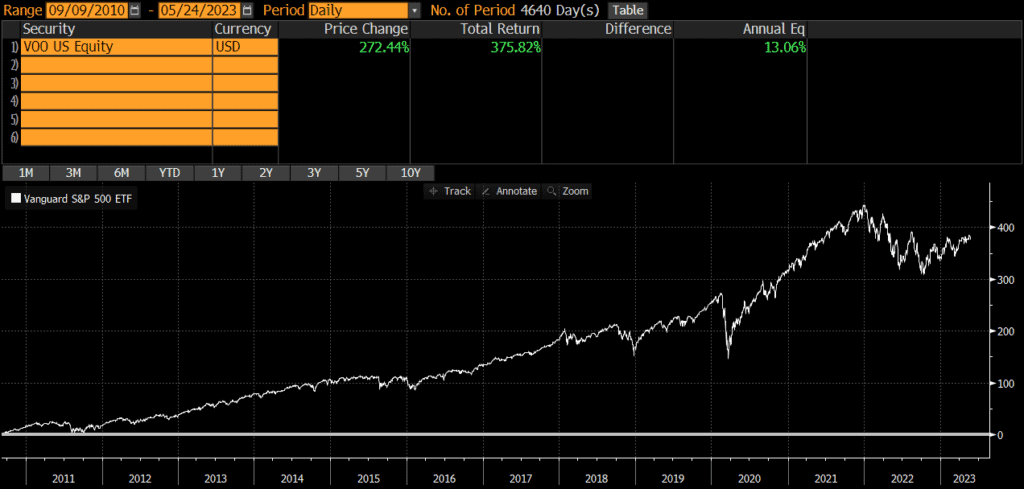The Vanguard S&P 500 ETF (symbol: VOO) is one of the largest exchange-traded funds (ETFs) in the market and widely used by both individual and institutional investors. VOO is a low-cost index fund, which tracks the S&P 500 Index. The fund seeks to provide exposure to the US stock market at a very low price. The fund is the core of many portfolios and the below review of VOO will evaluate why that is.
A quick reminder that this site does NOT provide investment recommendations. Fund reviews (such as this one) are for educational purposes only and are not advice or recommendations.
VOO Performance
The first thing most investors want to know about is performance, so we will start there. According to Bloomberg, since the fund’s inception 13 years ago, VOO has returned over 13% per year. Of course, this figure can go up or down and the returns in any single year are unlikely to be 13%. From 2011 through 2022 (12 years), VOO was up in 10 years and down in 2 years. The average return in the up years was 17.8%, while the average return in the down years was -11.34%.

VOO Risks
VOO owns stocks which are more volatile than cash or bonds. While the returns are higher than cash or bonds, investors need to be prepared to stomach volatility and be able to hold for the longer-term. VOO was down nearly 35% during the covid pandemic and down over 25% at one point in 2022. This is not necessarily worse than other similar funds, but it is a characteristic of stocks that investors need to be aware of.
VOO Portfolio
Fund performance is ultimately driven by a fund’s holdings and exposures, so our VOO review will examine these items.
VOO Holdings
VOO (and its underlying index) is incredibly diversified, holding over 500 stocks. This represents the large-cap segment of the US stock market.
| VOO | S&P 500 | |
| Number of Stocks | 505 | 503 |
VOO Country Exposures
VOO only owns US-based companies. Investors looking for international exposure may pair VOO with international ETFs or simply hold a global ETF.
VOO Market Cap Exposure
VOO is primarily a large-cap fund which seeks to represent the largest US stocks. Even though the fund holds some mid-caps, performance is primarily driven by the large-cap exposure.
| VOO | |
| Large-Cap | 83% |
| Mid-Cap | 17% |
| Small-Cap | 0% |
VOO Sector Exposures
VOO is extremely diversified across sectors and mirrors the approximate weights of the broad US stock market.
| VOO | |
| Basic Materials | 2.35% |
| Consumer Cyclical | 10.17% |
| Financial Services | 12.59% |
| Real Estate | 2.62% |
| Communication Services | 8.28% |
| Energy | 4.69% |
| Industrials | 8.18% |
| Technology | 26.42% |
| Consumer Defensive | 7.32% |
| Healthcare | 14.49% |
| Utilities | 2.88% |
Expenses
No review of VOO would be complete without an in-depth look at the explicit and implicit costs of trading and holding VOO.
VOO Expense Ratio
VOO’s expense ratio of .03% is among the lowest of any large-cap funds. Even if another fund is free, three basis points is not a material difference in my opinion.
VOO Transaction Costs
ETFs are free to trade at many brokers and custodians, so VOO should be free to trade in most cases. Additionally, it is among the largest ETFs and is very liquid. The bid-ask spread of VOO is about .01%, so individual investor trades will not generally be large enough to impact or move the market.
VOO Tax Efficiency
Like most index funds, VOO is very tax-efficient. Unlike actively-managed funds, passively-managed index funds typically have less trading and lower turnover. This results in fewer taxable events and higher tax efficiency.
ETFs are typically more tax-efficient than mutual funds, due to their ability to avoid realizing capital gains through like-kind redemptions (a process that is beyond the scope of this post). VOO has never made a capital gains distribution, so VOO is about as tax-efficient as any fund can be.
Investors in a high tax bracket with at least $250,000 may consider direct indexing rather than VOO, as direct indexing can potentially generate even more tax savings.
VOO Review: A Recap
The above review of VOO illustrates that VOO is a well-constructed, low-cost and tax-efficient index fund that provides diversified exposure to the US stock market. VOO is a great choice in many situations and a tool that I often use personally and professionally.